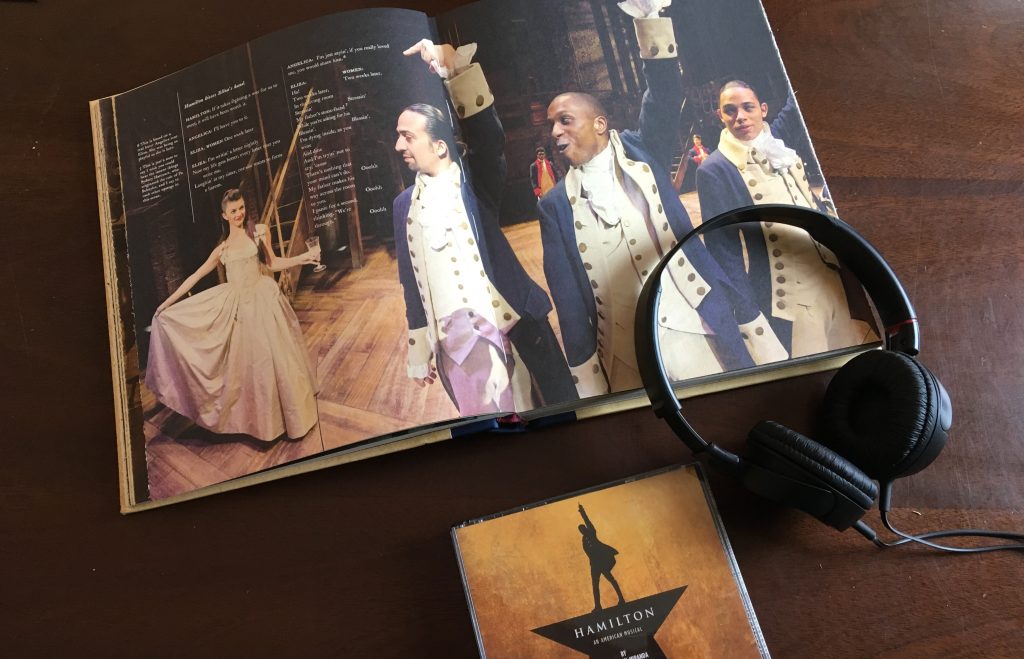by Carol S. Hyman

Of course, there was a line for the ladies’ room.
It was intermission at Hamilton. Lyrics reverberated in my mind: “I am not throwing away my shot!” (See the original Broadway cast perform it at the White House.) Thrilled by what I’d witnessed, eagerly anticipating the second act, I didn’t mind waiting. I may have come late to the party of the “ten-dollar Founding Father without a father,” but his ticket is still hot and I had one.
The play ends with the question, “Who lives, who dies, who tells your story?” If he could peer through the centuries, Alexander Hamilton would probably be delighted at how his is being told. The production is full of catchy lines that stick in the mind like burrs (sorry!); it resurrects a time when history was happening, and reminds us that it still is. I’m surely not alone in being inspired by this hip-hop historical musical to work harder to help the American experiment succeed.
A fan since I first saw the documentary about the making of it, I bought the original cast recording, pored over the book with annotated lyrics and essays, even read most of the biographical tome on which the play was based. Still, not having seen it in person, I felt like I was on the sad side of unrequited love.
And so, I was elated to discover, in planning a quick visit to our son who’s in business school in Chicago, that relatively reasonable matinee seats could be had on Easter Sunday. But only relatively reasonable, hence my conundrum: was it worth buying a ticket for my husband? His response to the documentary (and as much of the soundtrack as I had played for him) had been lukewarm. It’s always more fun to share an outing like that, unless your companion is a buzzkill.
Discussion with friends who had seen it confirmed what I thought: preparing for the experience would enhance it; my husband agreed that before we went, he would listen to it on headphones, following along with the lyrics; he did, and at the performance, to my delight, he seemed thoroughly engaged, especially enjoying the unexpectedly remarkable choreography.
Reflecting afterwards gave rise to the realization that watching Hamilton is not that different from what we experience in general. As Ferris Bueller said, “Life moves pretty fast. If you don’t stop and look around once in a while, you could miss it.”
Hamilton does move pretty fast, filled to the brim with how-do-they-get-that-all-out-in-one- breath lyrics. But the line for the bathroom at intermission moved more slowly and so, with time to eavesdrop on conversations, I discovered that not everyone was as enthralled as I was. Overheard: “It moves so fast, I can’t keep up.” “Some of the time I can’t even tell what’s going on.” “I’ve never been able to understand rap.” And the comment that made me happy for my husband’s sake: “I wish I’d listened to it a few times first.”
Training and preparation change the way we experience things. But unlike a play, life doesn’t offer us materials we can study in advance. Instead, our best chance of enriching our experience comes from learning how to direct our attention and sustain it as we choose. That’s the goal of mindfulness practice. Through that practice we gain clarity on what is going on inside of us – our thought patterns and emotional reactions. Familiarity with these enables us to see more clearly the patterns that exist around us and how our own projections may be coloring our perception. This allows us to more easily discern the advantages that might be available in any given moment.
One ever available advantage is our ability to tune in afresh to the vividness and complexity of our surroundings. Because I have paid so much attention to it, each time I reengage with Hamilton, I’m delighted to find, like Easter eggs, more surprises. Lin-Manuel Miranda and his collaborators worked to pack into their tale of the life of a remarkable person as much of the human experience as they could, and in so doing to showcase brilliant and diverse arts and talent.
While daily life may not be curated by such gifted people, paying thorough and alert attention to every detail in each moment – whether we’re looking out the window at hopeful birds waiting for spring, or savoring our scrambled eggs, or sorting the laundry – can pay unexpected dividends. With a well-trained mind, we can give each moment our best and so make the most of life.
As Hamilton suggests, if we look around we can see how lucky we are to be alive right now, when history is happening. And seeing that every instant is a once-in-a-lifetime shot, we can resolve, like Miranda’s imagined long-ago patriots, not to throw a single moment away. Even when we’re standing in line.




